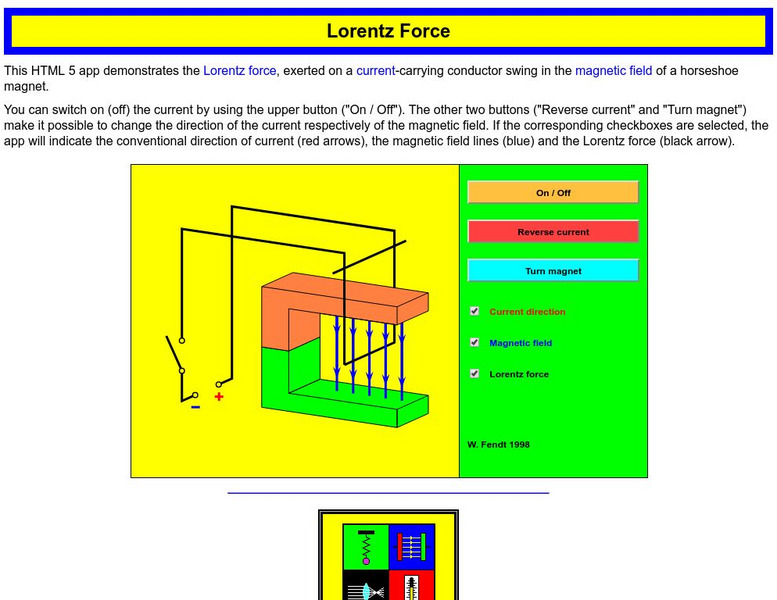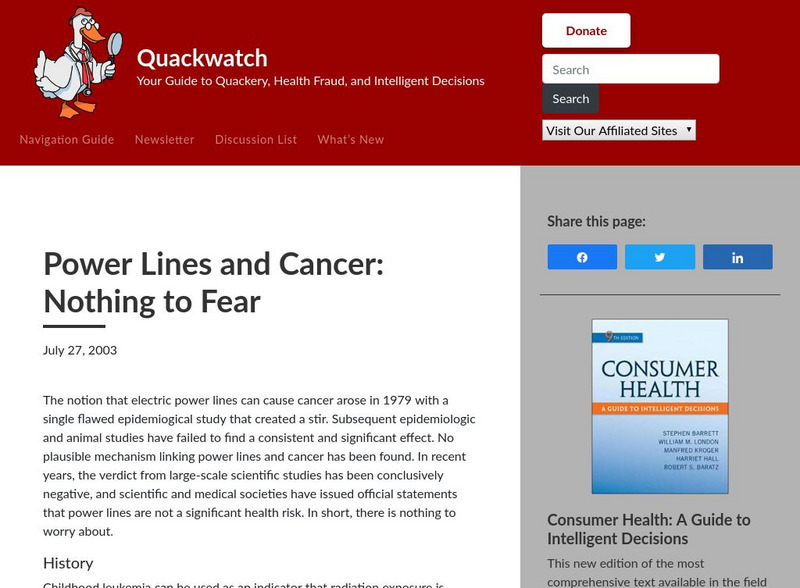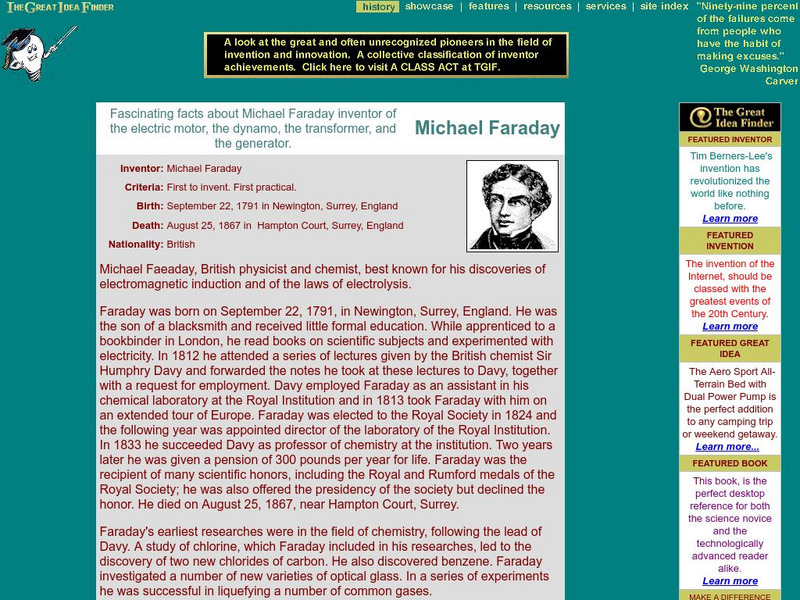Walter Fendt
Walter Fendt: Lorentz Force
This interactive simulation demonstrates the Lorentz force.
Curated OER
Educational Technology Clearinghouse: Clip Art Etc: Michael Faraday
(1791-1867) British scientist, chemist, physicist, and philosopher who greatly contributed to the fields of electromagnetism and electrochemistry. His main discoveries include the magnet field, electromagnetic induction, diamagnetism,...
Museum of Science
Museum of Science and Industry: Online Science: Build an Electric Motor
Step-by-step illustrated instructions show how to build a simple electric motor using everyday materials to make a wire coil spin. An explanation of the science involved is given at the end, as well as tips on troubleshooting any...
Khan Academy
Khan Academy: What Is Faraday's Law?
Do you know how to induce an electromotive force? This reference page will help you understand why Faraday's law mean and how to use it.
University of St. Andrews (UK)
University of St. Andrews: Charles Augustin De Coulomb
A large complete authoritative biography of Coulomb. Five large pictures, over a dozen links to contemporaries, references, a poster, other mathematicians. A fine source.
University of St. Andrews (UK)
University of St. Andrews: Andre Marie Ampere
Resource provides a biography of the scientist Andre Marie Ampere.
Science Buddies
Science Buddies: Build Your Own Windmill Generator
Build your own windmill and see how the wind can be converted into energy to produce electricity. This science fair project should help you understand the use of wind as a source of alternative energy. The Science Buddies project ideas...
Walter Fendt
Walter Fendt: Apps Zur Physik
This site, in German, offers numerous apps that illustrate common physics principles. Apps are organized into categories: mechanics, oscillations and waves, electrodynamics, optics, thermodynamics, the theory of relativity, physics of...
Other
Quackwatch: Power Lines and Cancer Nothing to Fear
This site explores the history of power lines and cancer associations, as well as dispelling the myth. The science is explored by citing known facts, studies and experts in the field.
University of Colorado
University of Colorado: Physics 2000: The Big Picture
Ever wondered how your TV produces those images on the screen? You can use the explanations and the interactive applets on these pages to find out how a cathode ray tube allows you to watch your favorite show!
Science Struck
Science Struck: The 13 Types of Energy and Their Applications
Read about all the different kinds of potential and kinetic energy. Includes energy formulas and examples of energy applications.
CK-12 Foundation
Ck 12: Interactive Physics for High School
This digital textbook covers core physics concepts and includes interactive features, real world examples, videos, and study guides.
Great Idea Finder
The Great Idea Finder: Michael Faraday
A solid biography of good length and history of Faraday's work. Complete, readable, thorough. Picture. Lots of links to other sources, including Joseph Henry's claim that *he* was first, and another about Faraday's kinetic flashlight!
Physics Classroom
The Physics Classroom: Put the Charge in the Goal
Students face a game-like challenge to use electrostatic forces to move a charged puck into a goal. By placing charges on the rink, a charged puck can be attracted and repelled around obstacles and into a goal.
TED Talks
Ted: Ted Ed: String Theory and the Hidden Structures of the Universe
What is everything made of? Thus far, we can break everything in the universe down to a few very small elementary particles. But they fit into strange patterns that are not understood. Clifford Johnson describes these ideas, along with...
CK-12 Foundation
Ck 12: Physical Science for Middle School
This digital textbook covers core physical science concepts and includes interactive features, real world examples, and videos.
Discovery Education
Discovery Education: Physical Science
The Discovery Channel provides numerous lesson plans dealing with the physical sciences. Content is organized by grade level, but all lesson plans include suggestions for adaptations for older or younger audiences.
NASA
Nasa: Imagine the Universe: Welcome to the World of Multiwavelength Astronomy!
This Imagine the Universe site provides an introduction into the multiwavelength universe and astronomy. Site provides graphics, links to a quiz, facts on this topic as well as teacher resources.










